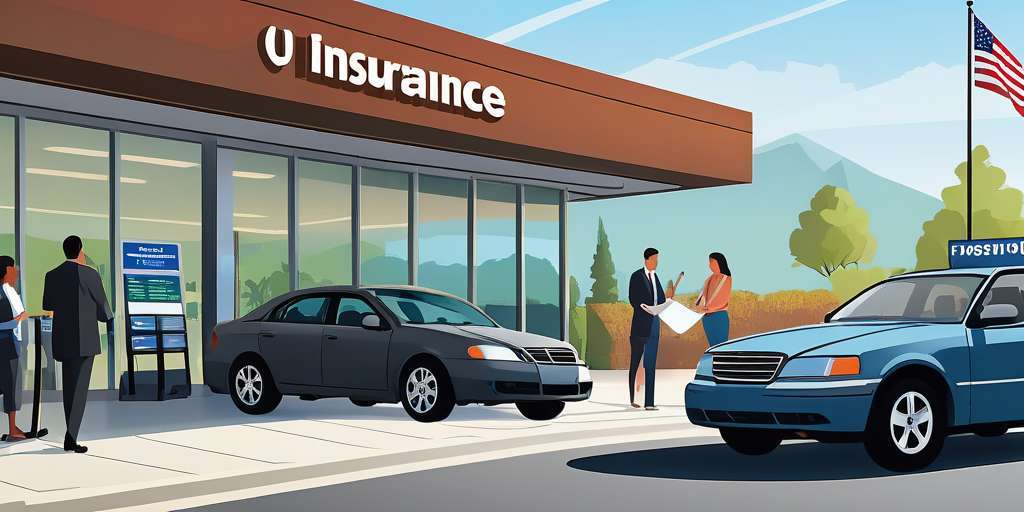Obtaining a car and insurance as a tourist in the U.S. can be a complex process. To legally drive in the country, visitors must have car insurance, whether renting a vehicle or bringing their own from abroad. Insurance options vary, and some agencies may require a U.S.-issued driver’s license. Buying a car can be done through dealerships or private sellers, but ensuring proper documentation is crucial. Foreign-owned vehicles may require insurance from U.S.-based agencies. Researching insurance resources and comparing coverage options online is recommended. Understanding requirements and finding adequate coverage are key for tourists navigating the U.S. car insurance system.

Can Tourists Buy a Car and Insurance in the U.S.?
As a tourist visiting the United States, you may wonder if it’s possible to purchase a car and insurance during your stay. The answer is yes, it is indeed possible to buy a car and obtain insurance as a foreign visitor in the U.S.
When it comes to car insurance, it’s important to note that driving without insurance is illegal in the U.S. Whether you plan to rent a car or bring your own vehicle from your home country, having valid car insurance is mandatory to legally operate a vehicle in the United States.
If you decide to rent a car during your visit, you can typically purchase insurance directly through the rental agency. They offer different coverage options to suit your needs and provide protection in case of accidents or damages.
For tourists who bring their own vehicle from their home country, purchasing insurance from a U.S.-based insurance agency is necessary. However, it’s worth noting that some insurance companies may not provide coverage to foreign drivers. In such cases, it may be required to obtain a U.S.-issued driver’s license or an International Driving Permit (IDP) as proof of driving qualifications.
Buying a car in the U.S. is also an option for tourists who plan to stay for an extended period. You can purchase a vehicle either from a dealership or a private seller. However, it’s crucial to ensure that the private seller has all the necessary valid ownership documents before making the transaction.
Once you’ve finalized the car purchase, it’s essential to visit a local motor vehicle agency office to complete the necessary paperwork and register the vehicle in your name as the new owner.
While obtaining car insurance for foreigners can be challenging due to certain requirements, several insurance companies may offer coverage to individuals with recognized foreign licenses or an International Driving Permit. Researching different insurance companies and coverage options online before your trip to the United States can help you find suitable insurance for your needs.
Remember, having a valid driver’s license from your home country and proper car insurance that meets the state requirements are essential for driving in the U.S. Being aware of these regulations and making sure you have adequate coverage will contribute to a smooth and legally compliant driving experience during your time as a tourist in the United States.
Understanding Car Insurance Requirements for Foreign Drivers
When it comes to car insurance in the U.S., foreign drivers, including tourists, need to understand the specific requirements they must meet. This includes obtaining a driver’s license and exploring insurance options, whether they choose to rent a car or bring their own vehicle from their home country.
Obtaining a Driver’s License in the U.S.
Foreign drivers who plan on driving in the U.S. for an extended period may need to obtain a driver’s license issued within the country. The requirements for obtaining a license vary by state, but generally, individuals can visit their local Department of Motor Vehicles (DMV) office to complete the necessary paperwork and pass a written and practical driving test. If you are a short-term visitor, using your valid driver’s license from your home country along with an International Driving Permit (IDP) is typically sufficient.
Insurance Options for Tourists Renting a Car
For tourists planning to rent a car in the U.S., insurance options are available through the rental agency. These options often include liability coverage, collision damage waivers, and personal accident insurance. It’s essential to carefully review the rental agreement and understand the coverage provided. You may also be able to use your existing car insurance policy from your home country, as some policies extend coverage to rental cars abroad. Ensure you check with your insurance provider beforehand and understand any limitations or requirements.
It’s crucial for foreign drivers to navigate the car insurance requirements in the U.S. Understanding the process of obtaining a driver’s license, whether it’s necessary for your stay, and exploring insurance options for rental cars can help ensure compliance and peace of mind during your time in the country.
Buying a Car in the U.S. as a Foreign Visitor
Buying a car in the U.S. as a foreign visitor is an exciting prospect, offering freedom and convenience during your stay. There are two primary options for purchasing a vehicle: from a dealership or from a private seller.
Purchasing a Vehicle from a Dealership
Buying a car from a dealership provides certain advantages, such as a wide selection of new and used vehicles, financing options, and warranties. As a foreign visitor, you’ll need to provide necessary documentation, including your passport, proof of address, and a valid international driver’s license or a driver’s license from your home country.
At the dealership, you can browse the available cars, take test drives, and negotiate the price. Once you’ve selected a vehicle, the dealer will assist you with the necessary paperwork, including the bill of sale, title transfer, and any additional fees or taxes.
It is crucial to thoroughly inspect the vehicle, review its history report, and ensure all documents are accurate before finalizing the purchase. This process will help protect your investment and give you peace of mind with your new car.
Buying a Car from a Private Seller
If you prefer buying a car directly from a private seller, there are some important considerations to keep in mind. Begin by researching available platforms and listings, such as online marketplaces, local classifieds, or community bulletin boards.
When meeting with the seller, inspect the vehicle carefully, paying attention to its condition, mileage, and any potential issues. It is wise to request a vehicle history report to ensure transparency about previous accidents or damages.
Agree on a fair purchase price and negotiate the terms of the sale, including any warranties or guarantees. Once a deal is reached, both parties will need to complete several essential steps, such as signing a bill of sale, transferring the title, and updating the vehicle registration.
Before finalizing the transaction, it is advisable to have a qualified mechanic inspect the car. This will help identify any hidden problems and give you confidence in your purchase.
Buying a car in the U.S. as a foreign visitor can be a rewarding experience. Whether you choose to purchase from a dealership or a private seller, ensure you have all the necessary documentation, thoroughly inspect the vehicle, and follow the proper legal procedures. Enjoy your newfound mobility as you explore the beautiful landscapes and destinations across the United States.
Finding Insurance Coverage for a Foreign-Owned Vehicle
When it comes to insuring a foreign-owned vehicle in the U.S., there are a couple of options available. Whether you brought your vehicle from your home country or purchased one in the U.S., it’s essential to have the appropriate insurance coverage to comply with legal requirements.
Insuring a Vehicle Brought from the Home Country
If you brought your car from your home country to the U.S., you’ll need to obtain insurance for it. To ensure a smooth process, consider the following steps:
- Research U.S.-based insurance agencies: Look for insurance providers that specialize in coverage for foreign-owned vehicles. These agencies have experience dealing with the unique requirements and challenges involved.
- Provide necessary documentation: You’ll likely need to provide documentation such as your vehicle’s title, bill of sale, and any import/export documents. These documents help establish ownership and facilitate the insurance process.
- Meet insurance requirements: Ensure that the insurance policy you choose meets the minimum coverage requirements set by the state where you plan to register the vehicle. Each state has its own insurance requirements, so it’s crucial to verify and comply with them.
Securing Insurance from U.S.-based Insurance Agencies
If you decide to purchase a vehicle in the U.S. as a tourist, you can obtain insurance from U.S.-based insurance agencies. Here’s what you need to know:
- Research reputable insurance providers: Look for well-established insurers with a good track record. Consider factors such as coverage options, customer reviews, and pricing.
- Obtain a U.S. driver’s license: Some insurance agencies may require a U.S.-issued driver’s license to provide coverage. If you plan to stay in the country for an extended period, it might be necessary to obtain a local driver’s license.
- Compare coverage options: Different insurance providers offer various coverage options, such as liability, collision, and comprehensive insurance. Take the time to compare policies and choose the one that best suits your needs.
- Provide necessary information: When applying for insurance, you’ll need to provide details about the vehicle and your driving history. This information helps insurers assess risk and determine the appropriate coverage and premium.
Securing insurance coverage for a foreign-owned vehicle involves navigating through the intricacies of the U.S. insurance system. Following the guidelines above and working with experienced insurance providers can help simplify the process and ensure that you have the necessary coverage for your vehicle during your stay in the U.S.
Exploring Insurance Resources and Comparison Tools
When it comes to finding the right insurance coverage as a tourist in the U.S., it’s crucial to explore various insurance resources and take advantage of comparison tools. These resources and tools can help you make informed decisions about your car insurance options.
Using Online Resources to Compare Insurance Quotes
One of the most convenient ways to explore insurance options is by using online resources. Many insurance companies and comparison websites provide platforms where you can easily compare insurance quotes from multiple providers. By entering your vehicle details, personal information, and coverage preferences, you can quickly gather quotes tailored to your specific needs.
Take your time to thoroughly review these quotes, considering the coverage limits, deductibles, and any additional benefits offered. It’s also essential to read customer reviews and check the reputation and financial stability of the insurance companies you are considering. This will help you make an informed decision about which insurance policy suits you best.
Calculating Insurance Costs and Coverage
Calculating insurance costs and coverage is an important step in determining the right policy for your needs. Insurance premiums can vary based on factors such as your driving record, the type of vehicle you own, your age, and the coverage options you choose.
Many insurance companies provide online calculators that can help you estimate insurance costs based on your specific circumstances. These calculators take into account various factors and provide you with an estimate of the premium you can expect to pay.
Additionally, it’s crucial to understand the coverage options available to you. Liability insurance is typically required by law and covers damages you may cause to others in an accident. However, you may also consider additional coverage options like collision, comprehensive, or uninsured/underinsured motorist coverage, depending on your needs and budget.
- Liability insurance: Provides coverage for damages to others in an accident for which you are at fault.
- Collision coverage: Helps pay for damages to your vehicle in the event of a collision with another vehicle or object.
- Comprehensive coverage: Covers damages to your vehicle caused by non-collision incidents such as theft, vandalism, or natural disasters.
- Uninsured/Underinsured motorist coverage: Protects you if you’re involved in an accident with a driver who has inadequate or no insurance.
By understanding the different coverage options available and calculating the associated costs, you can make an informed decision about the insurance policy that provides the right coverage at a price that fits your budget.
Understanding Insurance Requirements for Short-Term Visitors
For short-term visitors to the U.S., understanding the insurance requirements is crucial to ensure compliance and protection during their stay. Whether renting a car or using their own vehicle, visitors should familiarize themselves with the following subtopics.
Short-Term Visitors and Rental Car Insurance
When renting a car as a short-term visitor in the U.S., it is essential to consider rental car insurance options. Rental car companies typically offer several coverage choices, including:
- Collision Damage Waiver (CDW): This coverage relieves the driver of responsibility for damages due to collisions.
- Loss Damage Waiver (LDW): LDW covers the cost of repairing or replacing a rented vehicle in case of damage or theft.
- Supplemental Liability Insurance (SLI): SLI extends the liability coverage provided by the rental company.
Short-term visitors should carefully review these options and assess their personal insurance coverage to make informed decisions about which policies to purchase. It is important to note that rental car insurance requirements may vary among different states and rental companies.
Coverage Options for Long-Term Visitors
For long-term visitors planning to use their vehicles or purchase a car during their stay in the U.S., there are insurance options available:
- Temporary Car Insurance: Some insurance companies offer short-term policies tailored for foreign drivers staying in the country for an extended period. These policies provide coverage similar to standard auto insurance policies.
- Non-Owner Car Insurance: Long-term visitors who do not own a car but frequently rent or borrow vehicles may find non-owner car insurance beneficial. This coverage offers liability protection when driving cars that are not owned by the policyholder.
- International coverage: Visitors should check if their home country’s insurance policy extends coverage to their activities in the U.S. Some international insurance policies may provide limited coverage for driving in foreign countries, including the U.S.
Long-term visitors should consult with insurance providers to determine the most suitable coverage options based on their specific needs and duration of stay in the U.S.
Helpful Tips for Buying Car Insurance as a Tourist
When purchasing car insurance as a tourist in the U.S., it’s crucial to ensure adequate coverage for your vehicle and find ways to save money. Here are some helpful tips to consider:
Ensuring Adequate Coverage for Your Vehicle
1. Understand your insurance needs: Determine the appropriate coverage limits based on your specific requirements and the value of your vehicle.
2. Consider liability insurance: In the U.S., liability insurance is typically required by law. It covers damages and injuries you may cause to others.
3. Explore comprehensive and collision coverage: These optional coverages protect your vehicle against theft, vandalism, accidents, and other incidents.
4. Review policy exclusions: Pay attention to any exclusions or limitations in your insurance policy to ensure you have the necessary coverage.
5. Discuss additional coverage options: Depending on your needs, you may want to consider add-ons like roadside assistance, rental car coverage, or uninsured/underinsured motorist protection.
Saving Money on Car Insurance
1. Shop around for the best rates: Obtain quotes from multiple insurance companies to compare prices and coverage options.
2. Consider higher deductibles: Opting for a higher deductible can lower your insurance premiums. However, make sure you can comfortably afford the deductible amount in the event of a claim.
3. Look for discounts: Inquire about available discounts, such as safe driver discounts, bundled insurance packages, or discounts for installing safety features in your vehicle.
4. Maintain a good driving record: Keeping a clean driving record can help lower your insurance rates over time.
5. Take defensive driving courses: Completing a defensive driving course may qualify you for additional discounts and demonstrate your commitment to safe driving.
6. Consider usage-based insurance: Some insurance companies offer discounts based on your driving habits, using technology like telematics devices or smartphone apps to track your driving behavior.
Remember, it’s essential to research and understand the insurance requirements and options available to you as a tourist in the U.S. Take the time to compare quotes, assess your coverage needs, and explore ways to save money while ensuring adequate protection for your vehicle.






